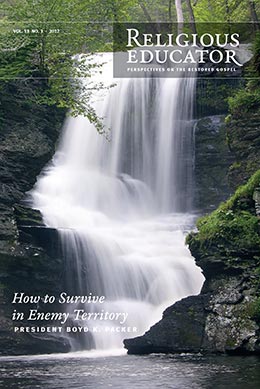The Power of the Word
Editor's Note
When Alma faced a developing Zoramite situation, he decided to “try the virtue of the word of God,” knowing that “the preaching of the word had a great tendency to lead the people to do that which was just—yea, it had had more powerful effect upon the minds of the people than the sword, or anything else” (Alma 31:5). At the centennial mark in the history of the seminary program, it is appropriate to consider the power of the word of God in the lives of young seminary students around the world.
My personal experience with seminary was limited to one year of early morning instruction when I was a senior in high school. Because my family lived twenty-two miles from the chapel where our seminary class met at 6:15 a.m., I was often groggy when we met. Our volunteer teacher instructed on the Book of Mormon that year. I think I read only to the end of 2 Nephi. But I went. And I felt the power of the word of God. Seminary was an important part of my spiritual development and of my commitment to the restored Church of Jesus Christ, as I am sure it has been in the lives of many others the past hundred years.
A number of articles in this issue deal with the New Testament, the portion of scripture that recounts the saving ministry of the Word, Jesus Christ, and his emissaries. In that era as well as in ours, our Lord’s “gospel came not . . . in word only, but also in power, and in the Holy Ghost, and in much assurance” (1 Thessalonians 1:5). Other articles herein focus on “sacred learning,” on reviving a “dead” class, and on the pathway provided to access the Lord’s mercy, all of which topics involve the word of God and its power.
As always, we at the RSC invite you to thoroughly explore this issue of the Religious Educator, trusting that its contents will assist you in more fully learning, and teaching with power, the word of God.
Dana M. Pike
Editor
